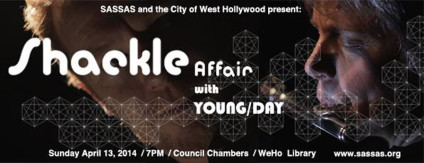shackle |ˈ sh akəl|
1. used in reference to something that restrains or impedes.
2. a metal link, typically U-shaped, closed by a bolt, used to secure a chain or rope to something.
Old English of Germanic origin; related to Dutch schakel ’link, coupling’.
This extraordinarily inventive duo has a way of making music all their own. At the heart of their duo is a self-designed, cutting-edge digital cueing system which operates as a sometimes visible third member. Both prodding and reactive, the Shackle system suggests musical directions and textures to these two highly gifted performers, opening up a fascinating array of sonic choices for La Berge and Deckard to play with and against.
Improvisation and structure coincide effortlessly in Shackle’s music. Working with a computerized communication system that proposes various compositional elements to each player, they can then choose whether or not to cooperate with the proposed material. Proposals involve aspects of restriction, either in sound material, timing, dynamics or other musical parameters.
Shackle’s performances explode the line between improvisation without borders and tightly controlled forms that are both playful and daring. With uncanny transitions that turn on a dime and long, spun-out tapestries of sound, Shackle’s music works on two levels at once: full of delightful discoveries that can happen in the blink of an eye, La Berge and Deckard savor the possibilities that those discoveries offer up.
Young and Day’s improvised music combines non-digitally processed electronics with digital, voice-controlled electronics and was born form the innate and disturbing similarities between the two instruments. Because of these similarities, mimicry and the morphology of sounds emerge while the slap of a tongue against the crunch of bow hair on vinyl interject musical inflections taking on a life of their own.



